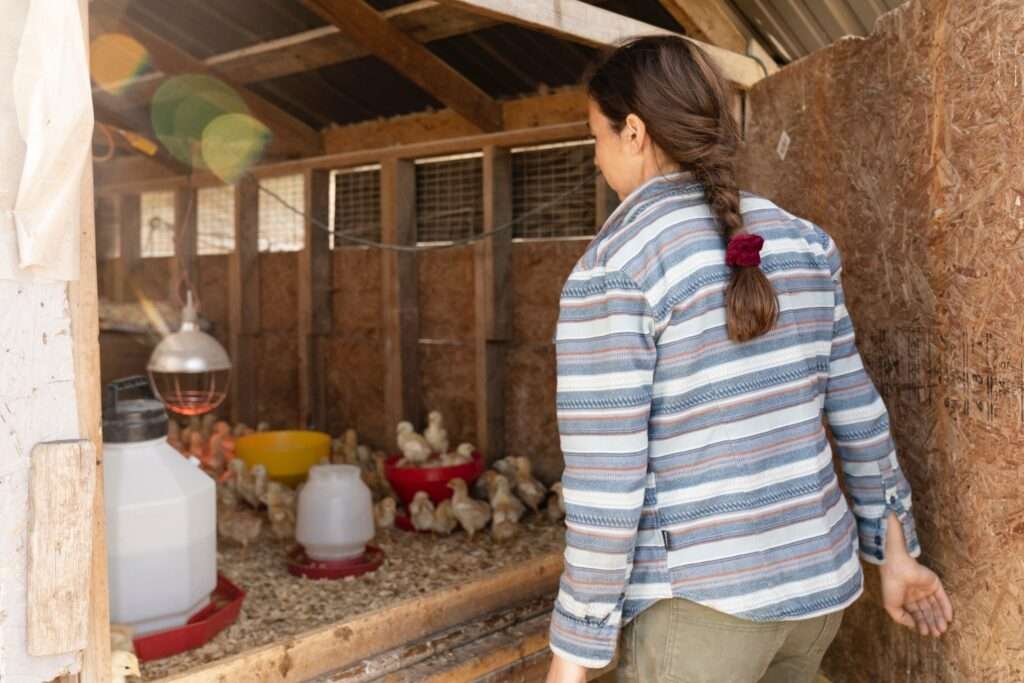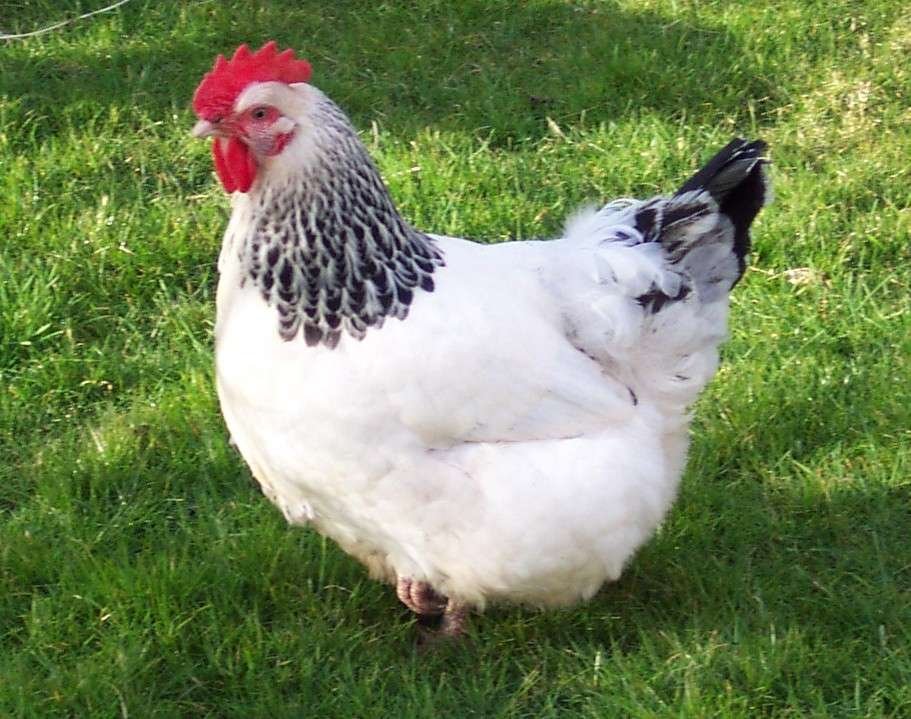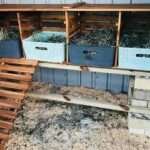There’s something immensely satisfying about venturing into your backyard, reaching into a cozy nesting box, and retrieving a warm, freshly laid egg from one of your beloved chickens. Egg collection is not only a rewarding experience but also an essential aspect of backyard chicken keeping. Proper egg collection techniques are crucial for ensuring egg quality, safety, and the well-being of your flock. In this article, we will delve into the art of egg collection, covering the frequency of collection, the age-old debate of washing eggs, how long fresh eggs last, proper egg storage, and techniques for collecting eggs from broody hens. Moreover, we will explore creative ways to involve kids in the process without the fear of dropped eggs or compromised hygiene.
How Often to Collect Eggs:
Establishing a regular egg collection routine is vital for maintaining healthy egg-laying behavior in your flock. Chickens tend to become broody and might start egg-eating behaviors if eggs are left in the nesting boxes for extended periods. The frequency of egg collection depends on various factors, including the size of your flock and environmental conditions.
For a small backyard flock, collecting eggs once or twice daily is typically sufficient. In warmer weather, consider increasing the frequency of collection to prevent eggs from sitting in the heat for too long, which can reduce their quality and increase the risk of spoilage. Be sure to collect eggs early in the morning and again in the late afternoon or early evening, as chickens generally lay eggs during these times.
To Wash or Not to Wash: Affecting How Long Fresh Eggs Last
The topic of whether to wash eggs has been a long-standing debate among chicken keepers. Eggs have a natural protective bloom or cuticle, a waxy coating that seals the pores on the eggshell. The bloom acts as a barrier against bacteria and moisture, helping to preserve the freshness of the egg. Washing eggs can potentially remove this protective layer, making the eggs more susceptible to bacterial contamination and reducing their shelf life.
Proponents of egg washing argue that washing is necessary to remove dirt, feces, or other contaminants from the eggshell, promoting better hygiene. If you choose to wash eggs, it is crucial to use water that is warmer than the egg’s internal temperature to prevent bacteria from being drawn into the egg. Additionally, use a gentle touch and avoid scrubbing the eggshell vigorously.
On the other hand, opponents of egg washing prefer to leave the bloom intact, relying on proper husbandry and cleanliness in the coop to prevent soiling of eggs. When eggs are collected promptly and stored in a clean environment, washing may not be necessary. Instead, use a dry cloth or fine sandpaper to gently remove any dirt or debris from the eggshell, if needed.
The decision to wash or not to wash eggs ultimately depends on your preference and the cleanliness of your egg-laying environment. If you choose to wash, do so with care and consider refrigerating the washed eggs promptly to reduce the risk of bacterial growth.
Keeping Eggs Clean: Preventing Poop and Debris on Eggs:
Maintaining a clean coop environment is essential for preventing soiling of eggs. Start by providing clean bedding and nesting materials in the coop and nesting boxes. Regularly clean out nesting boxes and replace soiled bedding to minimize the chance of egg contamination.
Strategically place nesting boxes to discourage chickens from roosting or defecating in them. Elevated or slanted nesting boxes can help prevent chickens from sleeping in the boxes, which reduces the likelihood of poop landing on freshly laid eggs.
Furthermore, ensure that your coop has sufficient space for your flock to move comfortably without overcrowding. Overcrowding causes more accidents and increased chances of eggs getting soiled.

Egg Storage and How Long Fresh Eggs Last:
Understanding proper egg storage is crucial for maintaining the quality and freshness of your collected eggs. Whether you decide to wash your eggs or leave them unwashed, certain storage practices will help prolong their shelf life.
The Protective Bloom and Egg Storage: As mentioned earlier, eggs have a natural protective bloom that seals the pores on the eggshell. This bloom helps prevent bacteria from entering the egg, maintaining its freshness. If you choose not to wash your eggs, the bloom remains intact, and the eggs can be stored at room temperature.
Room Temperature Storage: Room temperature storage can be a suitable option for unwashed eggs. You must however ensure your environment is relatively cool and consistent. Eggs stored at room temperature must be placed with the pointed end down. This helps maintain the yolk’s position and prevent air pocket expansion. Generally, eggs stored at room temperature can remain fresh for about two weeks, but this may vary depending on factors such as temperature and egg handling.
Refrigeration: If you prefer to wash your eggs, refrigeration is the preferred method of storage. Refrigeration slows down the natural breakdown of the egg and helps maintain its freshness for around 6 weeks. Place washed eggs in the refrigerator as soon as possible after collection. Store them on the refrigerator shelf, not in the door, to avoid temperature fluctuations.
Determining Egg Freshness: A simple way to determine the freshness of an egg is the water float test. Fill a bowl or container with water and gently place the egg into the water. Fresh eggs will sink to the bottom and lie flat on their sides. As eggs age, the air pocket inside the egg grows, causing it to become buoyant and slightly lift off the bottom. Older eggs will stand on one end or float entirely when placed in water and must be used promptly.
Collecting Eggs from Broody Hens:
Broody hens can become protective and defensive over their nesting area, making egg collection a delicate process. It is essential to handle broody hens with care and respect to avoid confrontations and stress.
Identifying Broody Behavior: A broody hen will exhibit distinctive behavior, such as sitting persistently on the nest, puffing up her feathers, and becoming territorial. She may also make growling or clucking sounds when approached. Identifying broody behavior will help you anticipate the hen’s reaction when collecting eggs.
Gentle Methods for Egg Collection: When collecting eggs from a broody hen, approach her calmly and avoid sudden movements. Use one hand to gently lift her and retrieve the eggs with your other hand. Some hens may become more tolerant of egg collection as they become familiar with your presence, but others may remain protective throughout their broody phase.
Utilizing a Broody Coop or Private Nesting Area: For a more peaceful egg collection experience, consider providing broody hens with a separate broody coop or a private nesting area away from the main flock. This will give broody hens the space and privacy they need while also allowing you to collect eggs without disturbance.

Involving Kids in Egg Collection: Fun and Educational Activities:
Egg collection can be an enjoyable and educational experience for children, fostering a sense of responsibility and appreciation for farm-fresh food. Involving kids in the egg collection process can be a rewarding family activity. However, it’s essential to ensure safety and hygiene while allowing them to participate.
Creating a Safe and Supervised Environment: When involving kids in egg collection, safety is paramount. Ensure that the coop and nesting areas are secure, and supervise children closely during egg collection. Teach them to handle the eggs gently to avoid dropping or cracking them accidentally.
Engaging Kids with Interactive Learning: Egg hunts are a fun way to engage kids in the egg collection process. You can hide plastic eggs around the coop or yard, and let them find and “collect” the eggs. Use this opportunity to teach them about chicken behavior, egg-laying, and the importance of egg collection.
Teaching Proper Egg Handling: Educate kids about proper egg handling, including how to hold an egg with both hands, avoiding excessive squeezing, and how to place eggs in a basket or container carefully. Encourage them to wash their hands after handling eggs to maintain hygiene.
Fun and Creative Ways to Use Fresh Eggs:
Having a steady supply of fresh eggs from your backyard flock opens up a world of culinary possibilities. Eggs are versatile and are used in a wide array of recipes, both savory and sweet.
Delicious Egg Recipes: From classic breakfast options like scrambled eggs, omelets, and frittatas to mouthwatering quiches and egg sandwiches, the options for egg-based dishes are endless. Explore different cooking techniques and experiment with various ingredients to create delectable meals for your family.
Baking with Fresh Eggs: Fresh eggs can make a significant difference in baking, resulting in lighter and fluffier cakes and muffins. The richness of fresh eggs can enhance the flavors of baked goods, elevating your culinary creations to new heights. Involve kids in baking projects using fresh eggs, and let them take pride in their delicious masterpieces.
Creative Egg Decorating and Crafting Projects: Beyond the kitchen, fresh eggs can be utilized in various crafting projects. Blow out eggs to create hollow eggshells to be painted or decorated for festive occasions like Easter. Eggshell mosaic art and eggshell candles are also popular DIY crafts that add a unique touch to home decor.

Common Mistakes to Avoid During Egg Collection:
To ensure the best possible egg quality and safety, it is essential to be mindful of common mistakes that can compromise the integrity of collected eggs.
Rough Handling: Rough handling can lead to cracked or broken eggs, making them susceptible to bacterial contamination. Teach everyone involved in egg collection, including children, to handle eggs with care and gentleness.
Neglecting Nesting Box Hygiene: A clean nesting box is vital for preventing soiled eggs. Neglecting to regularly clean out the nesting boxes and replace soiled bedding can increase the risk of egg contamination and spoilage.
Overlooking Egg Placement: The orientation of eggs in storage can impact their freshness. Place eggs with the pointed end down, as this helps maintain the yolk’s position and reduces air pocket expansion. This simple practice can contribute to extended egg freshness.
Storing Dirty or Cracked Eggs: Do not store dirty or cracked eggs. Soiled eggs can carry bacteria, and cracked eggs are more susceptible to contamination. Inspect eggs during collection, and avoid using eggs with visible cracks.
Egg Collection for Commercial or Community Use:
In commercial egg production or community egg-sharing programs, adhering to food safety standards is paramount to ensure the quality and safety of eggs.
Hygienic Collection Methods: Commercial egg producers must follow strict hygiene protocols during egg collection. This includes using sanitized equipment, proper handwashing, and regular cleaning and disinfection of the facilities.
Quality Control and Inspection: Commercial egg producers often have quality control measures in place. These include candling and inspection of eggs for defects before packaging. Remove eggs with abnormalities or imperfections from the batch.
Community Egg Sharing Programs: In community egg-sharing programs, ensuring proper storage and handling of eggs is essential to prevent spoilage. Educate participants on safe egg collection and storage practices.
How Long Fresh Eggs Last
Egg collection is not just about harvesting a food source; it is a journey of care and responsibility. By understanding the importance of egg collection frequency, the pros and cons of washing eggs, and ways to keep eggs clean, you can ensure the quality and safety of your backyard eggs. For broody hens, handle them with care and provide a separate nesting area if needed. Involving kids in the process can be a rewarding experience, fostering a love for nature and farm-fresh food.
Whether you use fresh eggs in delicious recipes, fun crafting projects, or share them with your community, the satisfaction of collecting eggs from your own flock is unmatched. Avoid common egg collection mistakes, and always prioritize hygiene to keep your eggs at their best. Whether you are a backyard chicken keeper or part of a larger egg production endeavor, responsible egg collection practices lead to healthy and delightful eggs that nourish your family and community. As you continue your egg collection journey, cherish the bond you build with your chickens and the joy of receiving the ultimate reward: a basket full of fresh, wholesome eggs from your beloved flock.






